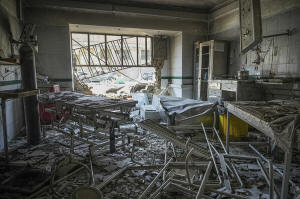Iran releases death toll of Israel’s Evin prison attack as officials
remain suspicious of ceasefire
[June 30, 2025]
By FARNOUSH AMIRI and DAVID RISING
DUBAI, United Arab Emirates (AP) — Dozens of staff members, two inmates
and a bystander were among the casualties of Israel's attack last week
on Tehran's Evin prison, a notorious facility where many political
prisoners and dissidents have been held.
The death toll from the strike was released Sunday by Iran's judiciary
and confirmed by human rights groups as the one-week mark of the
ceasefire between Israel and Iran approaches, despite suspicions on both
sides about whether the truce will hold.
Judiciary spokesperson Asghar Jahangir posted on the office’s official
Mizan news agency website that at least 71 people were killed by the
strike, including staff, soldiers, prisoners and members of visiting
families.
While officials did not provide a breakdown of the casualty figures, the
Washington-based Human Rights Activists in Iran said at least 35 were
staff members and two were inmates. Others killed included a person
walking in the prison vicinity and a woman who went to meet a judge
about her imprisoned husband’s case, the organization said.
The June 23 attack, the day before the ceasefire between Israel and Iran
took hold, hit several prison buildings and prompted concerns from
rights groups about inmates' safety.
It remains unclear why Israel targeted the prison, but it came on a day
when the Defense Ministry said it was attacking “regime targets and
government repression bodies in the heart of Tehran.”

The news of the prison attack was quickly overshadowed by an Iranian
attack on a U.S. base in Qatar later that day, which caused no
casualties, and the announcement of the ceasefire.
On the day of the attack, the New York-based Center for Human Rights in
Iran criticized Israel for striking the prison, seen as a symbol of the
Iranian regime's repression of any opposition, saying it violated the
principle of distinction between civilian and military targets.
Prison attack came near the end of 12 days of strikes
Over the 12 days before the ceasefire was declared, Israel claimed it
killed around 30 Iranian commanders and 11 nuclear scientists, while
hitting eight nuclear-related facilities and more than 720 military
infrastructure sites.
More than 1,000 people were killed, including at least 417 of them
civilians, according to the Washington-based Human Rights Activists
group.
In retaliation, Iran fired more than 550 ballistic missiles at Israel,
most of them intercepted, but those that got through caused damage in
many areas and killed 28 people.
Abbas Araghchi, Iran's foreign minister, said in a Saturday letter to
United Nations officials — obtained by The Associated Press — that the
international body should recognize Israel and the U.S. “as the
initiators of the act of aggression” against Iran over the war and that
their targeting of a sovereign country should require “compensation and
reparation."
At the same time, advocates have said that Iran was legally obligated to
protect the prisoners held in Evin, and slammed authorities in Tehran
for their “failure to evacuate, provide medical assistance or inform
families” following the attack.
[to top of second column]
|

In this photo taken Tuesday, June 24, 2025, rescuers search through
the rubble of a damaged section of Evin Prison following an Israeli
strike the day before, in Tehran, Iran. (AP Photo/Mostafa Roudaki/Mizan
News Agency)

The judiciary spokesperson said some of the injured were treated on
site, while others were taken to hospitals.
Iran had not previously announced any death toll at the prison,
though on Saturday, it confirmed that top prosecutor Ali Ghanaatkar
— whose prosecution of dissidents, including Nobel Peace Prize
winner Narges Mohammadi, led to widespread criticism by human rights
groups — had been killed in the attack.
He was one of about 60 people for whom a massive public funeral
procession was held Saturday in Tehran. He was to be buried at a
shrine in Qom on Sunday.
Iran worries whether the ceasefire will hold
While Israel and Iran have been adhering to the truce, Iranian
officials raised suspicions Sunday about whether the other side
would continue to keep its word.
Abdolrahim Mousavi, the chief of staff for Iran's armed forces, said
in a conversation with Saudi Arabia's defense minister that the
country is prepared if there were another surprise Israeli attack.
“We did not initiate the war, but we responded to the aggressor with
all our might, and since we have complete doubts about the enemy’s
adherence to its commitments, including the ceasefire, we are
prepared to give them a strong response if they repeat the
aggression,” Mousavi said, according to Iranian state TV agency IRNA.
It's unclear how much damage was done to the nuclear program
Much remained unclear about the status of Iran's nuclear program,
which incited the initial Israeli attack. U.S. President Donald
Trump says American strikes “obliterated” the program, while
Iranians say that he's exaggerating.
Rafael Grossi, the head of the International Atomic Energy Agency,
told CBS’ “Face the Nation” in an interview airing Sunday that
Iran's capacities remain, but it is impossible to access the full
damage to the nuclear program unless inspectors are allowed in,
which Iranian officials have not authorized.

“It is clear that there has been severe damage, but it’s not total
damage, first of all. And secondly, Iran has the capacities there,
industrial and technological capacities. So if they so wish, they
will be able to start doing this again," Grossi said.
___
Associated Press writer Sarah El Deeb in Beirut contributed to this
report.
All contents © copyright 2025 Associated Press. All rights reserved |